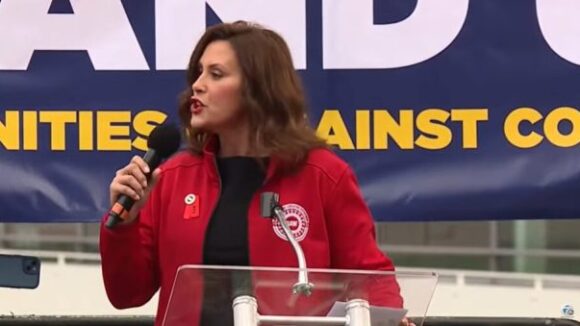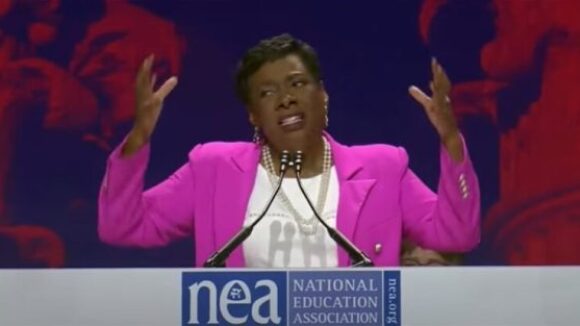Tyranny Triumphs in the Great Lakes State
Ignoring ample evidence of forced unionism’s unfairness and its damaging impact on jobs and incomes, Big Labor Michigan Gov. Gretchen Whitmer signed Right to Work destruction in 2023.
(source: National Right to Work October 2015 Newsletter)
By his own account, Vice President Joe Biden is still mulling over whether or not to seek the 2015 Democrat nomination for the presidency in late September, as this Newsletter edition goes to press.
 But at least Mr. Biden has never harbored any doubts about which side his political bread is buttered on.
But at least Mr. Biden has never harbored any doubts about which side his political bread is buttered on.
On September 7, he visited Pittsburgh, Pa., to speechify at the Allegheny County Labor Day Parade.
As journalist Byron York correctly noted in his report on Mr. Biden’s Labor Day appearance in the former Steel City, filed hours later for the Washington (D.C.) Examiner, the entire “point” of the vice president’s remarks was to “tell the unions: I’m with you. I’m your guy.”
The most remarkable portion of Mr. Biden’s address was the opening sentence. It was a more blunt statement than probably any other politician on the national scene today would make to characterize his or her career as a public official.
Sharing the stage with AFL-CIO czar Richard Trumka and Leo Gerard, the top boss of the United Steelworkers of America union (USWA/AFL-CIO), the vice president boasted: “My name’s Joe Biden and I work for Leo Gerard.”
What Politicians Do Is More Important Than What They Say
National Right to Work Committee President Mark Mix commented: “Politicians and their advisers are aware of survey data showing union bosses have little credibility with the public.
“For example, a recent Gallup poll found that American adults are more than twice as likely to say that they have ‘very little’ confidence in Organized Labor as say they have a ‘great deal.’
“For that reason, very few if any other politicians who are interested in becoming President are likely to join Joe Biden in acknowledging their subservience to union bigwigs in public. But what politicians do is more important than what they say.
“To find out what each of the current announced candidates for the Democrat and GOP presidential nominations would do with regard to labor policy upon becoming American’s next chief executive, the Committee will soon survey them regarding critical forced unionism-related issues.
“With the 2016 presidential primaries beginning in just a few weeks, I know millions and millions of Americans are looking for a clear alternative to the Obama Administration’s relentless promotion of compulsory unionism over the past seven years.”
Ever since he became U.S. President in January 2009, Barack Obama has eagerly championed Big Labor power grabs in
Congress and selected forced-unionism zealots for leadership positions at the National Labor Relations Board (NLRB), the Labor Department, and other federal bureaucracies.
Issue Is Especially Important in Early Presidential Primary States
But polls show the vast majority of all Americans who regularly vote in federal elections believe the Obama Administration is just plain wrong to favor forcing workers to pay union dues just to get a job.
And opposition to pro-forced unionism federal policies is especially intense among likely voters in the states where the crucial first contests of the 2016 presidential campaign will occur.
For example, surveys conducted for the Committee in late 2011 by respected pollster Kellyanne Conway showed that voters likely to participate in the January 2012 presidential ballots in New Hampshire and South Carolina, the first two primary states, overwhelmingly agreed that federal labor laws should protect the Right to Work.
Ms. Conway’s scientific survey found that 72% of likely Granite State primary voters believe federal law should “definitely not” allow “labor union officials to have a worker fired . . . for not paying union dues or fees.”
An additional 9% said federal law should “probably not” allow that.
‘Will the Next President Of the United States Stand up to Big Labor?’
In the Palmetto State, the results were even more lopsidedly pro-Right to Work.
An overwhelming 82% of likely South Carolina 2012 primary voters said federal law should “definitely not” sanction forced union dues or fees. Another 4% said “probably not.”
Committee President Mark Mix noted:
“The Obama Administration’s schemes to expand forced unionism, such as the recent decision by three Obama NLRB appointees to ignore the statutory definition of ‘employer’ in order to facilitate the corralling of millions of franchise and contract-company employees into unions, are very unpopular.
“As an alternative to Mr. Obama, freedom-loving Americans of all parties want a President who’s ready to fight for the Right to Work principle. Will the next President of the United States stand up to Big Labor?
“Or will he or she spend four years coddling the union bosses, or avoiding confrontation with them because they’re ‘too powerful’ to take on?”
Right to Work Supporters Have Concerns About Candidates In Both Major Parties
To clarify the intentions of all the announced candidates seeking the GOP and Democrat presidential nominations, the Committee will soon mail questionnaires to their campaigns asking where the candidates stand on nine key compulsory unionism-related issues.
“The good news is several candidates, including Rand Paul, Ted Cruz, and Lindsey Graham, have already gone on the record in support of hearings and congressional floor action on national Right to Work legislation,” said Mr. Mix.
“The bad news is that several other candidates, including Hillary Clinton, Bernie Sanders, and Martin O’Malley, have already sought to win Big Labor bosses’ support by pledging to VETO a national Right to Work law if it reaches their desk.
“While Ms. Clinton, Mr. Sanders and Mr. O’Malley are all seeking the Democrat presidential nomination, the fact is Right to Work supporters have concerns about candidates in both major parties.
“For example, just this summer current GOP frontrunner and businessman Donald Trump assured Newsweek’s Matthew Cooper that he has ‘great relationships with unions,’ that is, with Big Labor officials who force many of his companies’ employees to pay union dues or fees, or be fired.”
Mr. Mix urged Committee members, especially residents of early primary states, to lobby intensely all the candidates, including those who have seemed unsympathetic or openly hostile to Right to Work up to now.
“I would be overjoyed if all the Republican and Democrat candidates decided, in response to grass-roots activism, to oppose forced unionism in the future, regardless of where they have stood up to now,” he concluded.

Ignoring ample evidence of forced unionism’s unfairness and its damaging impact on jobs and incomes, Big Labor Michigan Gov. Gretchen Whitmer signed Right to Work destruction in 2023.

Largely thanks to the Right to Work attorney-won U.S. Supreme Court decision in Janus v. AFSCME, union bosses like NEA President Becky Pringle are no longer able to block virtually all meaningful education policy reforms.

Avelo employee Kim Howard believes all the firm’s flight attendants should get to vote on continued AFA rule. Credit: WTNH-TV (ABC,…